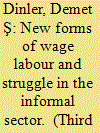| Srl | Item |
| 1 |
ID:
168022


|
|
|
|
|
| Summary/Abstract |
The essay examines the meanings of waste in the community formation of waste pickers in today’s Chinese megacities. We show that waste pickers in China echo to a certain extent the precarious and stigmatised labour conditions among those in the global south. But we have found that in China, financial reasons alone were not what pushed migrants to enter the trade. In fact, we have found that waste pickers in Beijing enter the waste business also to experiment with urban citizenship, freedom from the factory regime, entrepreneurship, and household making on the fringe of the nation’s capital. Their strategies of working with waste offer a prism for understanding the wider dimension of social and cultural life in the waste community in a major city of China – what we refer to as “living with waste.” “Living with waste” in this paper is intended as a framework to encompass the everyday effort to work with, experience, and live with waste matter on a daily basis. How do waste pickers talk about their job? Is it just about stigmatisation and suffering? Can it be about business and mobility? How do they feel about raising kids in a waste-collecting courtyard? If dirt is “matter of out of place” (Douglas 1966), how do they deal with impurity and contamination on a daily basis? What kind of efforts do they make to normalise or create boundaries in the undesirable working and living environment? Living with waste, then, is deeply bound with efforts not only to make a livelihood, but also to constantly negotiate one’s position with and draw boundaries from waste within the family and the community, in order to make the job bearable, and even meaningful.
|
|
|
|
|
|
|
|
|
|
|
|
|
|
|
|
| 2 |
ID:
148272


|
|
|
|
|
| Summary/Abstract |
In the absence of formal employment opportunities and with increasing urban and rural poverty, the informal recycling sector has become a means of survival for the past two decades in Turkey. In the capital city, Ankara, the large majority of waste pickers constitute former dispossessed Kurdish farmers who migrated to the city with their families from the southeastern regions as a result of forced migration, and seasonal Kurdish workers who alternate between rural and urban employment. The introduction of new waste management regulations in 2004 made the recycling market a significant area of struggle between local authorities, recycling companies and waste pickers. Local authorities have used these regulations to force waste pickers to sell their waste to certain recycling companies at a price lower than the market price. Waste pickers have reclaimed their right to work in the streets against the violence executed by the municipal police. This paper investigates the ways in which waste pickers should be considered wage labourers and what kind of a moral discourse they have used in making their demands vis-à-vis local governments during the process of intense conflict and negotiation.
|
|
|
|
|
|
|
|
|
|
|
|
|
|
|
|